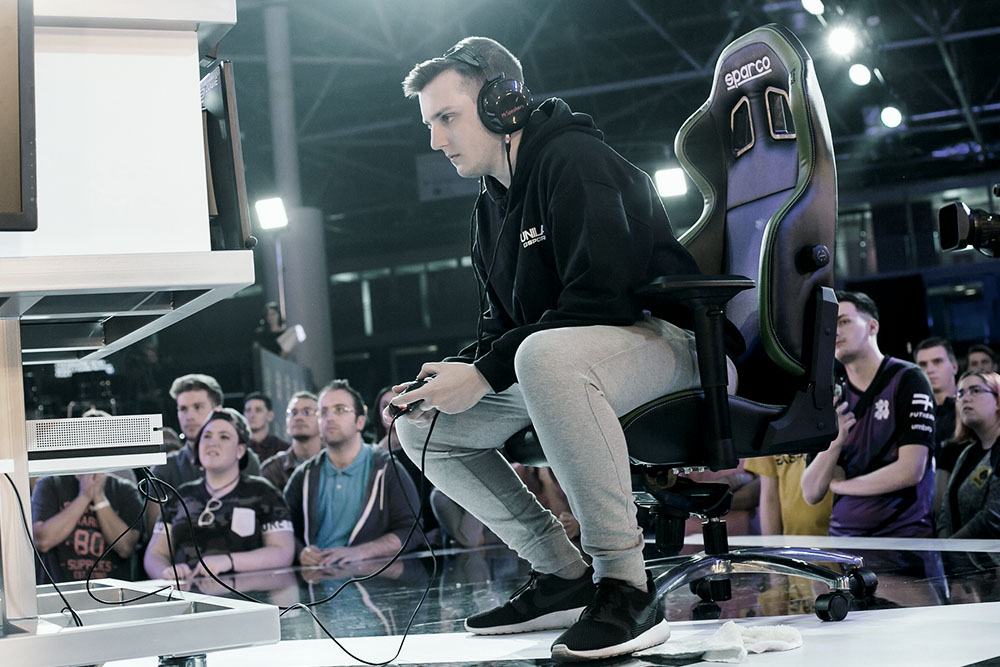This weekend, the best FIFA 17 players from around the globe are in Berlin competing for a piece of the $400,000 cash prize, including $160,000 first place purse. Over six million players competed in the FIFA FUT Champions Weekend League since the launch of FIFA 17, to secure one of the 192 live qualifications for the Season 1 and Season 2 Regional Finals. After six regional events, the top 32 players flew to Germany to crown a champion in the inaugural FIFA Ultimate Team Championship Series. Overall, $1.3 million will have been awarded through this series by this weekend.
The competition has been broadcast on YouTube, Twitch and Facebook, but the Finals will be broadcast across top sports networks around the world including ESPN, BT Sport, Movistar, MTG, and SPORT1, bringing competitive FIFA to more than 70 countries and millions of living rooms around the world. In the U.S., ESPN2 and ESPN Deportes will air the competition live on May 20 at 11 am EST. ESPN2 will air an exclusive pregame show at 10:30 am EST.
Brent Koning, FIFA Competitive Gaming Commissioner, told AListDaily that this new competition is the evolution of EA Sports’ FIFA franchise as an esport.
“Competitive FIFA has existed years before the FIFA Ultimate Team Championship Series was created, but it was very fragmented with concurrent tournaments, multiple winners, rule differences between tournaments,” Koning explained. “With the EA Competitive Gaming Division, along with the valuable support of FIFA, we’ve been able to consolidate tournaments, optimize the organizational structure and cultivate rapid growth. Competitive FIFA today is now mainstream entertainment – we’re talking millions of competitors, millions of spectators, mainstream sports broadcasts and more. It is amazing.”
Koning added that the ultimate goal for this competition was to move competitive FIFA into the mainstream across the globe. The FIFA Ultimate Team Championship will be watchable on mainstream sports broadcasts in roughly 70 percent of the FIFA player base’s home markets.
“We’re attracting not only millions of players, but millions of spectators as well,” Koning said. “To make competitive FIFA mainstream, you must capture a large, casual fan base who are already familiar with the sport of soccer’s rule sets. The best way to do this is to bring competitive FIFA to top-tier sports television – ESPN, BT Sport and more. We’re accomplishing this with the FIFA Ultimate Team Championship.”
More than six million players have competed in FUT Champions and thousands have played in the live events to get down to the top 32 video gamers. Konig said this inaugural series has taught him that community is king.
“They have been very supportive of competitive FIFA, and we are always looking for better ways to integrate content, showcase players, and make competitive FIFA more fun to watch and play,” Koning said.
Koning said the upcoming season of competitive FIFA will add brands and sponsors to the competition.
“With the goal of making stars of all of our players, we know we need to give them opportunities to compete, and that happens when you bring endemic and non-endemic brands into the fold,” Koning said. “Our goal is to make sure that we maintain a high level of competition, production quality, and create enough opportunity to support aspiring pros, our current pros, and drive the eco-system forward into the future.”
While the majority of esports games appeal to a global audience, FIFA crosses over with mainstream soccer (or football) fans worldwide. It’s easy to follow, and translates well to television broadcasts.
The extensive history of FIFA esports, coupled with the learnings of the EA Competitive Gaming Division with other titles, has helped in building out this new competitive series.
“Sharing best practices is important for any new team, be it at a large company like EA or a startup,” Koning explained. “I work with the central teams and other Commissioners at EA (for Madden and Battlefield) to make sure we are learning from each other, sharing successes and locating areas for improvement. We are lucky at EA to have a dedicated central team focused on implementing best practices across teams who speak to each other regularly. I don’t think you have the opportunity for collaboration as easily accessible in most companies.”
EA also has a longstanding relationship with FIFA. Koning said that organization sees the importance of esports and competitive gaming in soccer culture and it allows EA to work together with FIFA towards the common goal of spreading the love of soccer and competition worldwide.
Established soccer clubs like Manchester City, West Ham United and VFL Wolfsburg have invested in FIFA esports players, while Valencia launched a Rocket League team and Schalke bought a League of Legends roster.
“The level of integration varies by club, but is undoubtedly a way for them to engage with a younger, digitally-native demographic in a clean and low barrier of entry way,” Koning said. “At the end of the day, you put a ball in a net. That is universal.”

